大学英语(三)第5次导学资料
- 格式:doc
- 大小:80.00 KB
- 文档页数:6
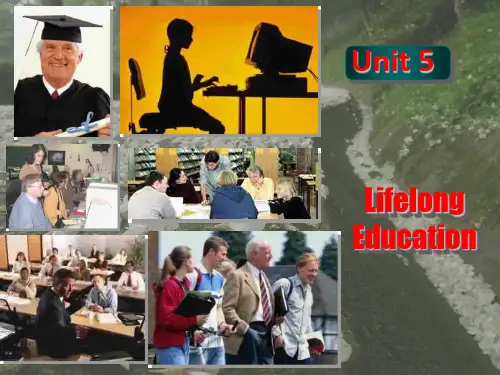
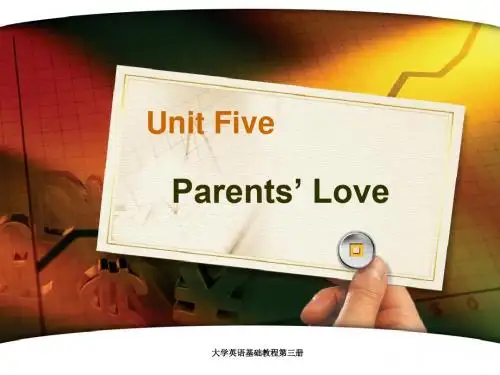
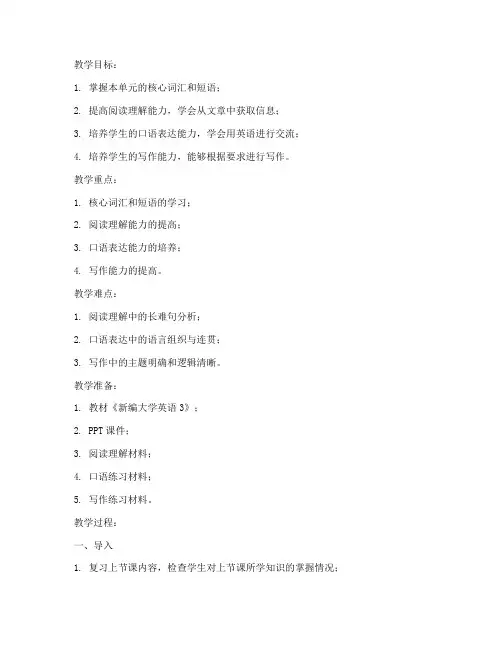
教学目标:1. 掌握本单元的核心词汇和短语;2. 提高阅读理解能力,学会从文章中获取信息;3. 培养学生的口语表达能力,学会用英语进行交流;4. 培养学生的写作能力,能够根据要求进行写作。
教学重点:1. 核心词汇和短语的学习;2. 阅读理解能力的提高;3. 口语表达能力的培养;4. 写作能力的提高。
教学难点:1. 阅读理解中的长难句分析;2. 口语表达中的语言组织与连贯;3. 写作中的主题明确和逻辑清晰。
教学准备:1. 教材《新编大学英语3》;2. PPT课件;3. 阅读理解材料;4. 口语练习材料;5. 写作练习材料。
教学过程:一、导入1. 复习上节课内容,检查学生对上节课所学知识的掌握情况;2. 引入本节课主题,激发学生的学习兴趣。
二、词汇教学1. 教师带领学生朗读本单元核心词汇,帮助学生熟悉发音;2. 教师解释词汇含义,并举例说明;3. 学生分组进行词汇接龙游戏,巩固词汇记忆。
三、阅读理解1. 教师讲解阅读理解技巧,如:快速浏览、查找关键词、归纳大意等;2. 学生自主阅读课文,完成阅读理解练习;3. 教师讲解阅读理解题的答案,分析解题思路;4. 学生总结阅读理解技巧,分享学习心得。
四、口语表达1. 教师讲解口语表达技巧,如:如何进行自我介绍、如何表达观点等;2. 学生进行口语练习,包括自我介绍、表达观点等;3. 教师点评学生的口语表达,提出改进建议;4. 学生分组进行口语对话练习,提高口语表达能力。
五、写作教学1. 教师讲解写作技巧,如:如何确定主题、如何组织文章结构等;2. 学生根据教师提供的写作题目,进行写作练习;3. 教师点评学生的写作,指出优点和不足;4. 学生修改自己的作文,提高写作能力。
六、总结1. 教师对本节课所学内容进行总结,帮助学生巩固知识;2. 学生分享本节课的学习心得,提高学习兴趣。
教学反思:1. 本节课是否达到了教学目标,学生对知识的掌握情况如何;2. 教学过程中是否存在难点,如何解决;3. 学生在口语表达和写作方面是否有所提高,如何进一步培养。
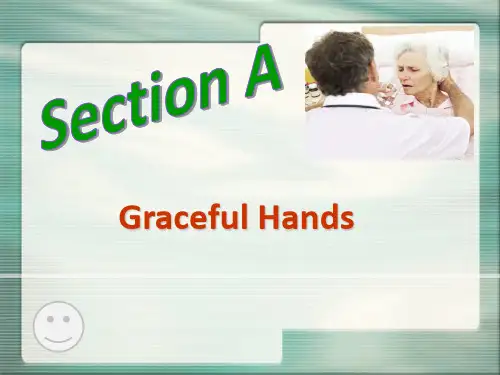
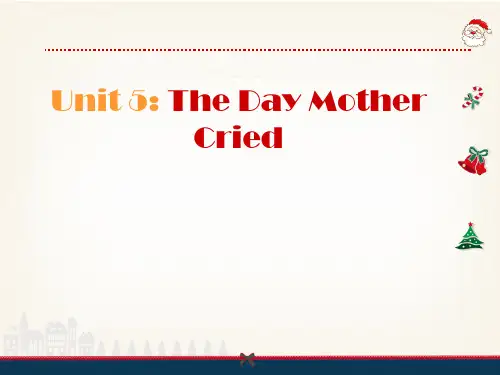
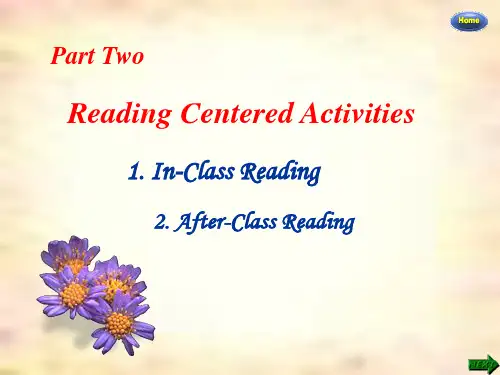
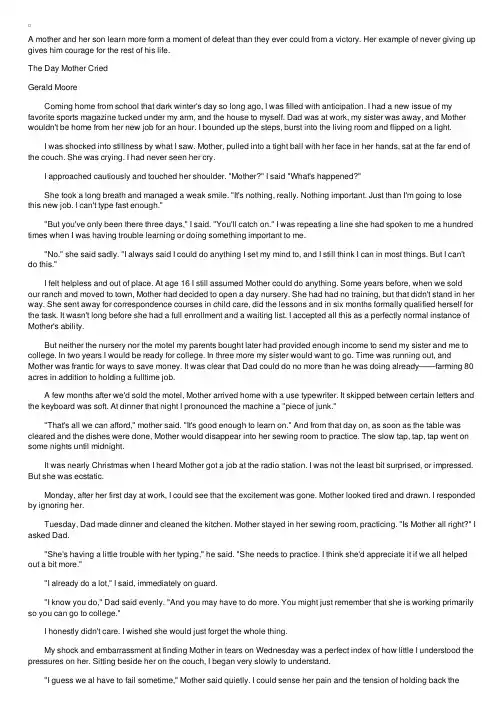
A mother and her son learn more form a moment of defeat than they ever could from a victory. Her example of never giving up gives him courage for the rest of his life.The Day Mother CriedGerald Moore Coming home from school that dark winter's day so long ago, I was filled with anticipation. I had a new issue of my favorite sports magazine tucked under my arm, and the house to myself. Dad was at work, my sister was away, and Mother wouldn't be home from her new job for an hour. I bounded up the steps, burst into the living room and flipped on a light. I was shocked into stillness by what I saw. Mother, pulled into a tight ball with her face in her hands, sat at the far end of the couch. She was crying. I had never seen her cry. I approached cautiously and touched her shoulder. "Mother?" I said "What's happened?" She took a long breath and managed a weak smile. "It's nothing, really. Nothing important. Just than I'm going to lose this new job. I can't type fast enough." "But you've only been there three days," I said. "You'll catch on." I was repeating a line she had spoken to me a hundred times when I was having trouble learning or doing something important to me. "No." she said sadly. "I always said I could do anything I set my mind to, and I still think I can in most things. But I can't do this." I felt helpless and out of place. At age 16 I still assumed Mother could do anything. Some years before, when we sold our ranch and moved to town, Mother had decided to open a day nursery. She had had no training, but that didn't stand in her way. She sent away for correspondence courses in child care, did the lessons and in six months formally qualified herself for the task. It wasn't long before she had a full enrollment and a waiting list. I accepted all this as a perfectly normal instance of Mother's ability. But neither the nursery nor the motel my parents bought later had provided enough income to send my sister and me to college. In two years I would be ready for college. In three more my sister would want to go. Time was running out, and Mother was frantic for ways to save money. It was clear that Dad could do no more than he was doing already——farming 80 acres in addition to holding a fulltime job. A few months after we'd sold the motel, Mother arrived home with a use typewriter. It skipped between certain letters and the keyboard was soft. At dinner that night I pronounced the machine a "piece of junk." "That's all we can afford," mother said. "It's good enough to learn on." And from that day on, as soon as the table was cleared and the dishes were done, Mother would disappear into her sewing room to practice. The slow tap, tap, tap went on some nights until midnight. It was nearly Christmas when I heard Mother got a job at the radio station. I was not the least bit surprised, or impressed. But she was ecstatic. Monday, after her first day at work, I could see that the excitement was gone. Mother looked tired and drawn. I responded by ignoring her. Tuesday, Dad made dinner and cleaned the kitchen. Mother stayed in her sewing room, practicing. "Is Mother all right?" I asked Dad. "She's having a little trouble with her typing," he said. "She needs to practice. I think she'd appreciate it if we all helped out a bit more." "I already do a lot," I said, immediately on guard. "I know you do," Dad said evenly. "And you may have to do more. You might just remember that she is working primarily so you can go to college." I honestly didn't care. I wished she would just forget the whole thing. My shock and embarrassment at finding Mother in tears on Wednesday was a perfect index of how little I understood the pressures on her. Sitting beside her on the couch, I began very slowly to understand. "I guess we al have to fail sometime," Mother said quietly. I could sense her pain and the tension of holding back thestrong emotions that were interrupted by my arrival. Suddenly, something inside me turned. I reached out and put my arms around her. She broke then. She put her face against my shoulder and sobbed. I help her close and didn't try to talk. I knew I was doing what I should, what I could, and that it was enough. In that moment, feeling Mother's back racked with emotion, I understood for the first time her vulnerability. She was still my mother, but she was something more: a person like me, capable of fear and hurt and failure. I could feel her pain as she must have felt mine on a thousand occasions when I had sought comfort in her arms. A week later Mother took a job selling dry goods at half the salary the radio station had offered. "It's a job I can do," she said simply. But the evening practice sessions on the old green typewriter continued. I had a very different feeling now when I passed her door at night and heard her tapping away. I knew there was something more going on in there than a woman learning to type. When I left for college two years later, Mother had an office job with better pay and more responsibility. I have to believe that in some strange way she learned as much from her moment of defeat as I did, because several years later, when I had finished school and proudly accepted a job as a newspaper reporter, she had already been a journalist with our hometown paper for six months. The old green typewriter sits in my office now, unrepaired. It is a memento, but what it recalls for me is not quite what if recalled for Mother. When I'm having trouble with a story and think about giving up or when I start to feel sorry for myself and think things should be easier for me, I roll a piece of paper into that cranky old machine and type, word by painful word, just the way mother did. What I remember then is not her failure, but her courage, the courage to go ahead. It's the best memento anyone ever gave me. NEW WORDS anticipation n. expectation anticipate vt. issue n. 发⾏物(刊物的)⼀期 tuck vt. put or push into a desired convenient position so as to hold tightly; draw together into a small space 塞(进);卷(起) bound vi. move along quickly by jumping or leaping movements 跳跃 flip v. turn or move quickly or with a jerk tight a. drawn, fixed or fastened together firmly 紧的,牢的 ad. firmly, closely couch n. a long comfortable seat with a back and arms on which more than one person may sit; sofa 长沙发椅 approach v. come near or nearer(to) cautiously ad. very carefully 细⼼地,谨慎地 cautious a. type vt. write (sth.) with a typewriter line n. a row of words in a poem; a row of words on a page of writing or in print (诗、⽂的)⼀⾏ helpless a. unable to look after oneself or take action to help others, powerless assume vt. take as true without actual proof; suppose 假设,主观认为 ranch n. a very large farm for raising horses, cattle or sheep ⼤牧场,⼤农场 nursery n. a place where small children are temporarily cared for 托⼉所 day nursery n. a place where small children are cared for during the day training n. the process of training or being trained; instruction correspondence n. the act of exchanging letters 通信 correspondence course n. an educational course in which instruction and work are exchanged between the teacher and student by post 函授课程 formally ad. according to proper rules or lawful forms 正式地 formal a. qualify vt. make fit or competent for a special purpose 使具有资格 enrol(l)ment n. the number of people who have registered themselves as members of a school, a program, etc.; registering 注册⼈数,注册,登记 enrol(l) v. 注册,登记 motel n. a roadside hotel providing overnight lodging for motorists 汽车旅馆 frantic a. wildly anxious, afraid, happy, etc. acre n. 英亩 addition n. the act of adding 加,加法 full-time a. occupying all normal working hours typewriter n. 打字机 keyboard n. the set of keys on a typewriter, piano, etc. 键盘 junk n. old useless things 破烂,垃圾 tap n. a short light blow 轻叩 midnight n. the middle of the night 午夜 ecstatic a. marked by a state of overwhelming emotion, esp. great joy 欣喜若狂的 drawn a. (of the face) looking very tired or worried or tense 憔悴的;紧张的 respond vi. act in answer to the action of another; answer dad n. (colloq.) father evenly ad. calmly, peacefully even a. primarily ad. mainly; chiefly embarrassment n. a feeling of shyness, shame or guilt index n. sign or indication 指数,指标 pressure n. a constraining influence upon the mind (⼼理上的)压⼒ tension n. (a feeling of) nervous anxiety, worry, on pressure 紧张 arrival n. the act of arriving rack vt. shake violently 猛⼒摇动 vulnerability n. being liable to be damaged or hurt 易受伤性;脆弱性 vulnerable a. dry goods (AmE) cloth, ribbons, laces, curtains and similar textile fabrics 织物尖商品 session n. a meeting or period of time devoted to a particular activity 会议;(从事某项活动的)⼀段时间 journalist n. a person whose profession is writing for, editing, or publishing newspaper or magazines, a reporter 新闻⼯作者,记者 memento n. sth. which reminds one of a holiday, a friend, etc. 纪念品 cranky a. (of a machine) shaky; malfunctioning 不稳的;有⽑病的 PHRASES & EXPRESSIONS have sth. to oneself have sth. for one's own private use at work working; operating catch on (to) (informal) learn; understand 学会,懂得 set one's mind to (or on) pull all one's efforts into doing (sth). 决⼼做 stand/be in sb's way be in a position to delay or prevent someone from his intended actions 阻碍,妨碍 send away for request (sth.) or order (goods) to be sent by post 函索 run out come to an end; be used up 到期;⽤完,耗尽 in addition (to) besides; as well (as) help out give help; help (sb.) at a time of need 帮助;帮助(某⼈)摆脱困境 on guard ready to defend or protect; watchful 警惕,提防 in tears crying hold back control; make (sth.) stay in place 抑制,阻⽌ go on take place or happen go ahead make progress; advance。


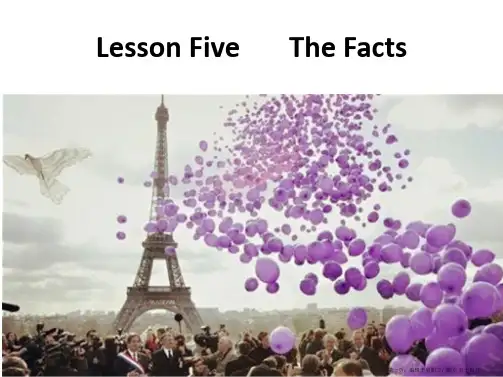
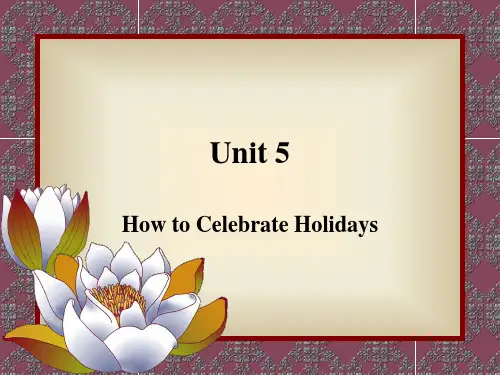
新视野大学英语第三版第三册-unit-5-Section-B课件.ppt课件概述本课件为新视野大学英语第三版第三册Unit 5的Section B 部分的课件,主要涵盖了本节课的核心内容。
通过本课件的学习,学生将能够掌握本节课的重点词汇、语法以及相关练习。
本课件将以清晰的图文结合的形式呈现,帮助学生更好地理解和吸收知识。
课件目录1.课前导入2.词汇学习3.语法讲解4.相关练习5.课堂总结1. 课前导入课前导入部分将提出一些问题和话题,引发学生的思考和讨论,为接下来的学习做好铺垫。
示例•Have you ever had difficulties expressing your opinions in English?•How do you usually express your agreement or disagreement in English?•What kind of phrases or expressions do you know for expressing opinions in English?2. 词汇学习本部分将介绍本节课的重点词汇,并结合实例进行解释和讲解。
示例•express (v.) - 表达– e.g. She expressed her excitement by jumping up and down.•opinion (n.) - 意见– e.g. Everyone has different opinions on this matter.•agreement (n.) - 同意– e.g. They reached an agreement on the terms of the contract.3. 语法讲解本部分将重点讲解本节课的语法知识和使用方法,并通过例句进行说明和练习。
示例•Expressing agreement and disagreement–To express agreement, we can use phrases like:–I agree with you.–That’s true.–Absolutely.–To express disagreement, we can use phrases like:–I’m afraid I can’t agree with you.–I have a different opinion.–I see your point, but I don’t think so.4. 相关练习本部分将提供一些与语法知识相关的练习题,帮助学生巩固所学内容。
考点规范练15(必修3Unit 5)Ⅰ。
阅读理解When you're looking forward to taking a holiday in Egypt,you’re certainly not short of choices。
The country has so many to see thatyou'll probably not want to limit yourself to just one city.Hurghada-A Water Sports ParadiseWith 250 hotels ranking from comfortable 3-star hotels to 5—star accommodation,the main attraction of staying here is the activities in and on the warm waters。
It has become an international centre for water sports,allowing visitors to take part in surfing,sailing and deep-sea fishing.The waters are also home to a huge variety of coral andfish,making it a dream spot for diving。
If all that isn't enough,Hurghada is home to some of the world’s finest underwater gardens。
Luxor—An Open-air Museum of Ancient HistoryFor those with an interest in Egyptian history,Luxor is an excellent place to stay and is built upon the site of the ancient Egyptian city of Thebes。
四川大学现代远程教育《课程论坛》导学资料(第5期)课程名称:大学英语(三)层次:专升本专业:各专业《大学英语(三)》第5阶段课程学习导学资料(考前导学)一、本阶段课程学习的主要内容:内容一:复习教材《大学英语》第3册所要求的精读课文;复习前面所学的交际用语、语法知识、阅读、写作方法与技巧。
内容二:完成教材《大学英语》第3册中的两套自测模拟题.内容三:完成国家网考委考试辅导资料《大学英语》(B部分)第5套模拟试题;复习前面已完成的模拟题。
内容四:复习《大学英语(三)》课程学习指导资料。
二、本期复习重点难点及解题方法技巧:(一)交际用语部分A.复习重点:复习前两个阶段所学交际用语句型。
重点复习:打电话、感谢、道歉、赞美、祝愿与祝贺、意愿与愿意、邀请、请求、帮助;B.解题原则和方法:交际用语就是英语国家人民的日常生活用语。
这部分要求考生掌握一些基本日常生活用语知识、句式和应答技巧。
在学习、使用和复习交际用语部分时,大家要掌握使用交际用语的几个原则:1. 礼貌原则无论在任何场合、表达什么看法/情感,发话/发问和应答都要有礼貌,即使表达不同看法或批评意见,也要委婉间接表达,使对方听起来不刺耳,例如:【示例一】— Hello, may I talk to the director now?— ______.A. Sorry, he is busy at the momentB. No, you can‟tC. Sorry, you can‟tD. I don‟t know解析:此题第一说话人想找主任接电话,对方表示主任正忙,所以不能接电话。
此时遵循礼貌原则,在回绝时应该委婉间接,答案B,C,D都是直接回绝,只有A比较委婉。
2. 利他原则在日常交际中,英语国家人民形成了一种习俗,即要尽可能为对方提供帮助和方便,对别人遇到的好事/成功要表示高兴,坏事要表示难过/惋惜,对别人的询问,回答要直扣主题,提供所需要的信息,因此在交际用语中也要体现出来这种倾向,例如:【示例二】—I was worried about math., but Mr. Brown gave me an A!—_______.A. Don‟t worry about itB. Congratulations! That‟s a difficult courseC. Mr. Brown is very goodD. Good luck to you!解析:此题第一说话人告诉对方自己在考试中获得A等,显然是一个另人高兴的成绩。
按照利他原则,应对别人遇到的好事/成功要表示高兴。
因此,选B,祝贺对方。
3. 文化遵从原则在选择交际用语时,大家要有跨文化视角,也就是说,要克服本民族的习惯思维和应答模式,要使用得体的、符合对方习惯的方式来应答。
例如:【示例三】—That‟s a beautiful d ress you have on!—.A. Oh, thanks. I got it yesterday.B. Sorry, it‟s too cheap.C. Y ou can have itD. See you later.解析:由于英语和汉语之间存在一定的文化差异,在选择时应尊重英语中的文化习惯。
本题第一说话人赞美对方时,对方应该回答“Thank you.”表示感谢,而不应按照汉语中的文化习惯回答“No, no”表示谦虚,所以选A为最佳。
(二)阅读理解部分A.复习重点:阅读理解考试主要参考范围是网考委《大学英语》(B)第1-3套模拟题,《大学英语(三)学习辅导资料》综合练习中阅读部分。
B.解题技巧:掌握一定的阅读技巧对于提高阅读速度,改进解题正确率是相当重要的。
在做阅读理解时,应该把注意力放在具有意义的意群上,而不是逐字逐句,或把注意力过多放在个别单词或句子上。
阅读技巧分为三类:1.略读法(Skinning)略读即跳过不重要的细节,描述及例子,进行快速阅读,从而获得文章的中心思想及大意,对文章的体裁,篇章结构有一定的了解。
2.查读法(Scanning)查读主要是针对要回答的问题快速查询全文,找到所需要的相关信息,再仔细阅读该部分内容,理解其字面意义及内涵,快速而准确地做出正确选择。
3.细读法(Scouring)根据题目在浏览全文后,找到相应的段落进行推敲,从而找到正确答案。
这三种方法适合不同的提问形式。
略读法适合于回答“主旨大意”题;查读法适合于事实“细节辨认”题;细读法适合于“判断推理题,观点态度题,语义题”等等。
阅读理解各种题型分五类:1.事实细节题一般说来,主要事实细节或特定细节问题均可在文章中找到回答。
但是需要注意的是,这些问题及其答案的表述常常不是采用文章中的原话,而是使用同义词或者同义结构来进行表述,比如“school”与“educational institution”, “died”与“passed away”等。
常见提问方式有:A. Why (Who,Where, what, when, how)…?2.判断推理题阅读一篇文章不能仅仅局限于对文字的理解,因为作者有时是以暗示或隐含的方式来表达他的思想、态度或情感。
在这种情况下,读者只有利用逻辑推理,在正确理解文章的基础上,根据上下文从已知信息中体会作者的真实意图,推断出文章中“文中所无,意中所有”的意思来。
常见的提问方式有:a. From the passage, it can be inferred that _______. 从这篇文章能够推断出……b. One could conclude from the passage that _______. 能够从这篇文章推断出……c. This passage has probably been taken from _______.文章很可能是从什么地方选出的?3.主旨大意题此种题型的关键是抓住文章的中心思想,找出主题句。
文章的主题句大多出现在文章的段首或结尾处,有些也出现在文章的中间段落。
在做这种题型时,应该细读文章的段首和结尾,找出核心词,抓住每段的主题句,明确文章的中心思想。
这类题目应该在通读全文后再做,或通过综合全文及其他题目的内容来确定主题。
常见的提问方式为:a. What‟s the main idea of the passage? 文章大意是什么?b. With what topic/theme/subject is the passage mainly concerned?文章主题是什么?c. The passage mainly tells us ____.文章主要告诉我们什么?4.观点态度题一般这种题是问及作者叙述的语气和他本人对某事的态度。
客观的(objective), 主观的(subjective),赞赏性的(appreciative), 讽刺的(satiric), 肯定的(positive), 否定的(negative), 乐观的(optimistic), 悲观的(pessimistic)等。
常见的提问方式有a. How do es the author feel about…? 作者认为……怎么样?b. What‟s the author‟s attitude towards…? 作者对……是什么看法或态度?c. The tone of the author is ______. 作者的语气或态度是什么?5.词义题阅读理解的词义题并非是单纯地考查词汇量,而是考查学生在一定的上下文中辨认和推测词义的能力。
常见命题方式:a. The word ….(Line…, Para…) most prob ably refers to ______.b. In this passage, … probably means ______.c. The word “…”coul d best be replaced by which of the following?(三)语法与词汇部分A.本期复习重点:词汇部分:复习本期教材所学新的词汇及一些重要词汇的搭配、用法、近意词辨析。
掌握《大学英语》(B)第1-3套模拟题中语法和词汇部分的词汇练习。
B.解题技巧【示例】第一种: 形近次辨析题Knowing first aid is _______ to saving lives. (选自第二次网上作业)A. cureB. cruelC. crucialD. crude讲解:A选项表示治疗、治愈,B选项表示残忍,C选项表示决定性的、重要的,D选项表示粗糙的、粗鲁的。
原句意思是“了解急救知识对于救助生命是致关重要的。
”所以选C。
第二种: 义近词辨析题What is the train ______ to Birmingham?A. feeB. tipC. fareD. cost讲解:此题四个选项都表示费用、花费,但A表示学费、会费等,B表示小费,C表示汽车、火车等交通费,D表示成本、价钱等。
因此正确答案为C选项。
第三种: 同词根、词缀题This kind of plant is widely all over China.A. contributedB. transferredC. distributedD. transported讲解:词汇的记忆、辨析还可借助于构词法。
选项的四个词汇中A…con-共同‟;B,D中的…trans-跨越、超越‟的意思,…dis-分离、分散‟的意识。
原句意思是这种植物在整个中国广泛分布。
所以通过前缀,就可判断选C。
第四种: 短语题There is such a lot of noise on the work site every day that the residents nearby find it hard to ______.A. put outB. put offC. put up withD. put up讲解:此题考查动词put相关的常用短语,put out使熄灭,put off推迟;put up with忍受;put up盖起、搭起;张贴。
而原句想表达“附近的居民难以忍受”。
所以选C。
第五种:固定搭配题He was _______ the preparation of an international conference when I arrived in Beijing.A. engaged toB. engaged forC. engaged onD. engaged in讲解:此题考查词语的固定搭配,我们常用be engaged in表示“正忙着、从事”,所以选D。
2.语法部分:复习本期所学语法知识,重点掌握:形容词和副词的比较级与最高级; 冠词;动词的基本时态与语态; 动词不定式、动名词、分词。